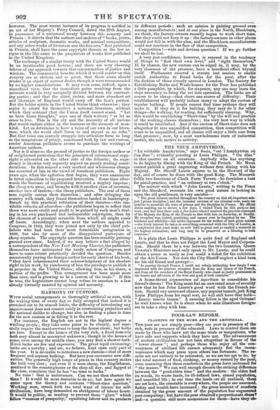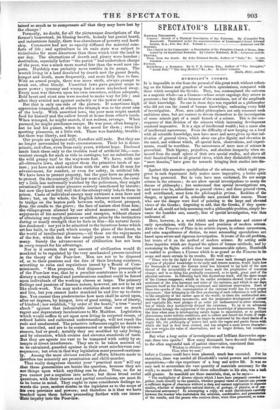POOR-LAW REFORM.
CLASHING OF THE RUDE AND THE A_RTIFICIAL.
THE poor are not simply poor—they are poor in presence of the rich, rude in presence of the educated. Laws to control them are made by those who have not the same trials or temptations, who have aids and supports which they have not. The advancement of modern civilization has not been altogether in favour of the "lower classes "; and perhaps those who enjoy all the con- veniences of civilized life cannot adequately feel the incon- veniences which may press upon others less fortunate. The re- sults are not entirely to be estimated, as we are too apt to do, by the total amount of food, clothing, or money earned by the poor, even assuming that those comforts in the gross have increased for "the masses." We can well enough discern the striking difference between the "good olden time" and the modern : the olden had its woods, its waste lands, its ill-defined laws, armed population, and unsettled life ; in our time the lands are all enclosed, there are set laws, the constable is everywhere, the people are unarmed. Safety and wealth have increased ; the gross amount of comforts obtained by the gross amount of the population has augmented past computing ; but have the poor obtained a proportionate share ? and—a question still more momentous for them—have they oh-
tamed so much as to compensate all that they may have lost by the change ? Formerly, no doubt, for all the picturesque descriptions of the farmer's homestead, its blazing hearth, homely but genial board, and industrious family, there was abundance of poverty and hard- ship. Commerce had not so equally diffused the material com- forts of life ; and agriculture in its rude state was subject to vicissitudes far more disastrous than those which visit the land in our day. The alternations of dearth and plenty were harsher ; destitution, especially before "the pariah" had undertaken charge of the poor, was a much more mortal fate than the word now im- ports. Hardship was probably more terrible in its pangs. The wretch living in a land desolated by dearth met the gaunt fiends, hunger and death, more frequently, and more fully face to face. With an armed people, there was more strife, always prompt to break out, often bloody. Unsettled laws gave greater scope to mere power ; tyranny and wrong had a more unchecked sway. Every man was thrown upon his own resources, seldom adequate. Bold heart and stout arm were needed to make way for life ; and often they availed not against audacity or the power of caste. But that is only one side of the picture. If sometimes high oppression triumphed, at others the triumph was to the stout arm of the lowly. With unsettled laws, the poor man might snatch food for himself and the callow brood at home from other's lands. When wronged, be might snatch, if not redress, revenge. When pursued, he might perchance escape. He was poor, often hungry ; but he had his games, when in the mood for them ; even his sporting pleasures, at a little risk. There was hardship, trouble; but there was liberty, and hope.
Our people are ignorant still, therefore still rude. But they are no longer surrounded by rude circumstances. Their lot is deter- minate, and often, even from early years, without hope. Enclosed lands limit them only to the trodden road of artificial life,—con- venient enough for such as ride in carriages, but no substitute for the wild grassy turf to the wayworn foot. We have, with our all-obtrusive laws, shut against them the primitive lands of na- ture; yet have not endowed them with the arts that fit man for advancement, for comfort, or even for safety, in artificial life. We have laws to protect property, but the poor have no property to protect. On the contrary, if the law were a little looser, the coun- try a little less universally watched by the policeman, they might occasionally snatch some pleasure scarcely sanctioned by statute; but now they know full well that the attempt only lodges them in prison. Cases of individual energy may extricate a man here and there; but, on the whole, the English labourer must be content to trudge on the beaten path between walls, without prospect, from the cradle to the grave ; the face of nature shut from him ; the village-green silenced by our altered manners ; with small enjoyment of his natural passions and energies, without chance of obtaining any rough pleasure or sudden prize by the instinctive daring or manly strength that he feels in him—his natural facul- ties deadened : nor yet is he admitted to the luxurious home which art has built, to the park which usurps the place of the forest, to the world of intellectual pleasures,—all these are the enjoyments of the few, which the few take small pains to extend for the many. Surely the advancement of civilization has not been in every respect for his advantage. Nor is it certain that any amount of civilization would fit mankind to be regulated by the very mechanical process involved in the theory of the Poor-law. Men are not to be disposed of, as to their passions and the fate of their livelong existence, according to rules and regulations issued by a Board of Com- missioners. "Man proposes, God disposes." The presumption of the Poor-law was, that by a peculiar contrivance in a scale of dietary a certain frugal and parsimonious conduct could be forced upon individuals of the working classes at large. The primary feelings and passions of human nature, however, are not to be set like clock-work. You may make statistics about men as they are and live, but you cannot make mankind be and live up to statis- tics. You cannot thus predetermine how men shall be acted upon, after set degrees, by hunger, love of good eating, love of liberty, of kindred; nor establish, "by order of the board," a true "moral check" against that indomitable instinct that cost so much regret and deprecatory lucubrations to Mr. Malthus. Legislation which would suffice to act upon men living in carpeted rooms, of refined habits and cultivated understandiugs, will not reach the zude and uneducated. The primitive influences ought no doubt to be controlled, and are to be counteracted or modified by circum- stances, bad or good; notably they are modified by easy living, and by education, which creates and elevates standards of taste. But they are agents too vast to be tampered with safely by at- tempts at direct interference. They are to be taken account of, to be calculated, guarded against in their overt mischievous con- sequences; but even in that way legislation must proceed cautious- ly. Among the most obvious results of efforts hitherto made to interfere too minutely are prostitution and child-murder. That really dangerous theorist your "practical man" will say that these generalities are beside the question, because they are not things upon which anything can be done. True, so far as you cannot put a negation into action; but those broad social questions, with their obscure and partial conclusions, are most fit to be borne in mind. They ought to raise considerate feelings to- wards the poor, modest doubts in the legislator as to the scope of his own province and powers ; and therefore is it that we have 'touched upon them before proceeding further with our imme- diate inquiry into the Poor-law.



























 Previous page
Previous page